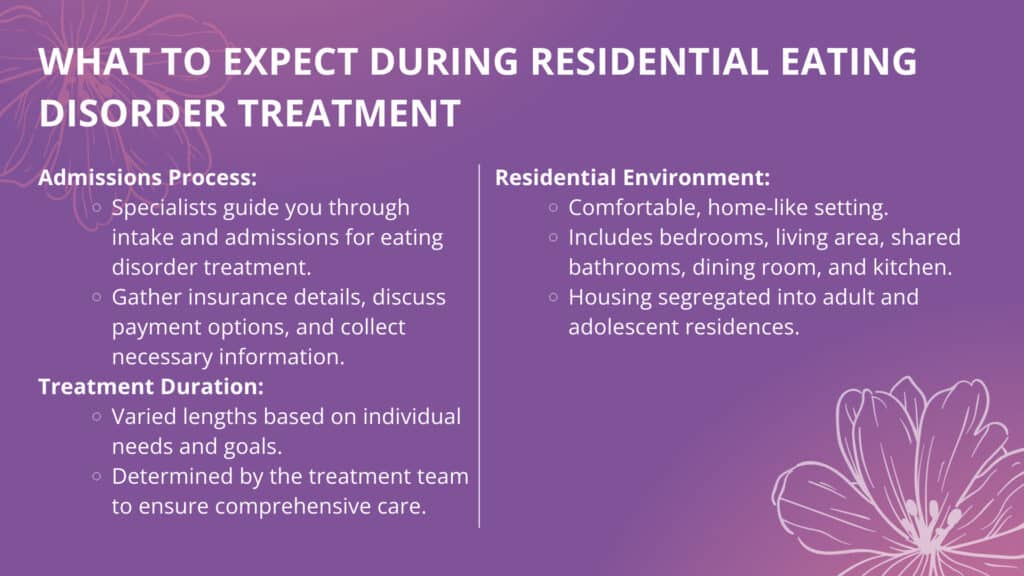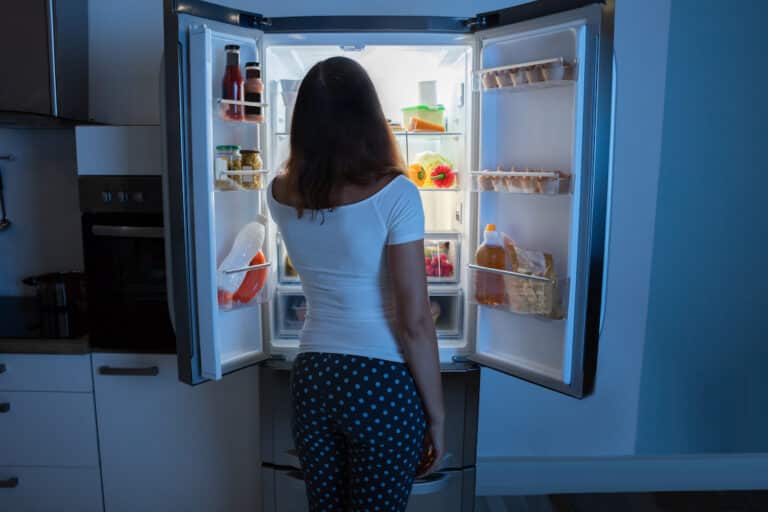Finding the appropriate treatment and recovering from an eating disorder depends on your unique journey toward healing. Many treatment options are available that offer varying degrees of intensity and care. You might wonder which type of eating disorder treatment program would be best for you and whether a residential program is the answer.
Whether you have experience with eating disorder treatment or this is your first time seeking help, there are a few fundamental and valuable things to know about residential treatment programs as you embark on your journey.
What Is Residential Eating Disorder Treatment?
Residential eating disorder treatment falls in between inpatient (hospitalization) and outpatient treatment programs. With residential programs, you temporarily live at the treatment facility to receive more intensive treatment than at a partial hospitalization or outpatient program. This type of treatment offers around-the-clock care for medically stable patients. Residential is a great way to transition out of inpatient treatment and is ideal for medically stable individuals who need additional treatment and supervision in managing their eating disorders.
Residential programs treat individuals presenting with all types of eating disorders, such as anorexia nervosa, bulimia nervosa, avoidant restrictive food intake disorder (ARFID), and other specified feeding and eating disorders (OSFED). Most patients have had prior eating disorder treatment in outpatient or inpatient settings (1).
Benefits of Residential Eating Disorder Treatment
Residential eating disorder treatment allows you to continue healing and learn how to manage your eating disorder in a more supervised environment than at home. A major bonus of this program is that you are not in a clinical, institutional setting but in an actual home in a residential neighborhood.
You will get to navigate your eating disorder treatment and experience real-life, home situations like preparing your meals, but you’ll be able to do this with 24/7 support from a staff of healthcare professionals trained in eating disorders.
You will benefit from a vast array of continuous guidance and support. Individual psychotherapy sessions will take place a few times per week based on what your unique treatment plan requires. You can participate in family sessions, nutrition counseling, meal support, group sessions, and recreational activities.
You will also benefit from interacting with others who share similar struggles as you and relying on the much-needed support you may not get at home.
Although individuals in residential homes will have primary diagnoses of eating disorders, facilities are equipped to treat dual diagnoses of mental health disorders and co-occurring substance use disorder, so your personalized treatment plan will address your eating disorder and all of your mental health needs.
Overall, residential treatment improves body image, psychological flexibility, motivation, management of eating disorder behaviors, and overall quality of life (2).
What to Expect During Residential Eating Disorder Treatment
Admissions specialists will walk you through the intake and admissions process within eating disorder treatment programs. In addition to gathering insurance information and providing payment options, they will collect the information required from you to determine which program is the right fit.
Treatment length will vary from individual to individual and will be determined by your treatment team and what it will take to meet your needs and goals.
The environment of a residential treatment program is that of a comfortable, home-like setting with bedrooms, a living area, shared bathrooms, a dining room, and a kitchen. Housing will be separated into either adult or adolescent residences.
Things You Need for Residential Eating Disorder Treatment
There are some practical things you will need for a residential program. Clothing, toiletries, outerwear, and mementos from home are some basic items you will need. Keep in mind, when it comes to technology, some items may be allowed, but there will be guidelines for their use while you are at the treatment center. The facility will provide a list of things to bring (and what is not allowed). This living situation is temporary, so anything you might miss while in treatment will be there for you when you return home.
Finally, it’s worth mentioning that you’ll need a bit of courage. Participating in a residential treatment program may feel scary at first, and you’ll need time to adjust, but remember that you’ve already taken the most courageous step by asking for help.
Finding the right treatment for your eating disorder is critical to preventing the severe physical and psychological consequences of an eating disorder. If you think a residential program might be right for you or need help deciding what type of treatment will be the right fit, contact the team at Magnolia Creek. Call us at 205-678-4373 to learn how our individualized therapies and programs at our eating disorder residential treatment center can benefit you.
References:
-
- Milco, A. (2022). Finding the right treatment for your eating disorder. National Eating Disorders Association.
https://www.nationaleatingdisorders.org/blog/finding-right-treatment-your-eatingdisorder - Peckmezian, T. & Paxton, S.J. (2020, May 28). A systematic review of outcomes following residential treatment for eating disorders. Eur Eat Disord Rev, 28 (3), 246-259. doi: 10.1002/erv.2733.
https://www.ncbi.nlm.nih.gov/pmc/articles/PMC7216912/
- Milco, A. (2022). Finding the right treatment for your eating disorder. National Eating Disorders Association.
Author Bio:
Kate Delaney Chen, BSN, RN-BC is a healthcare writer and registered nurse with over 17 years of bedside experience. She specializes in Psychiatric Nursing and Nephrology and currently works at a nationally recognized Inpatient Eating Disorders Program.





